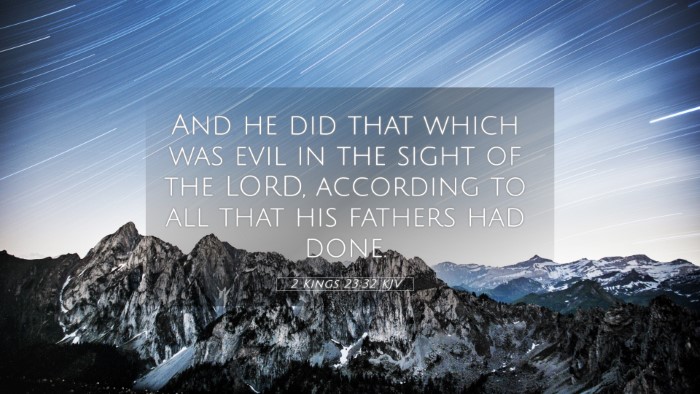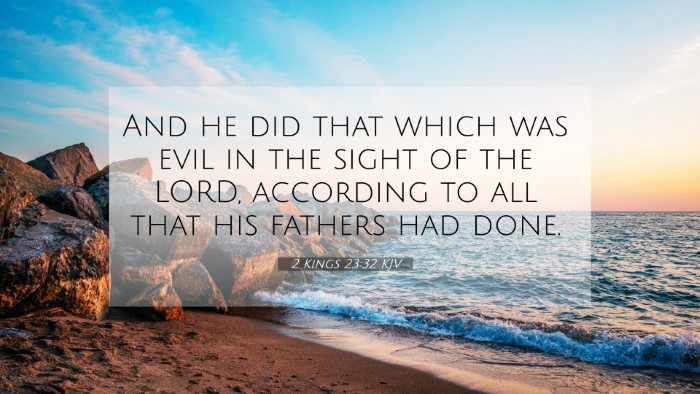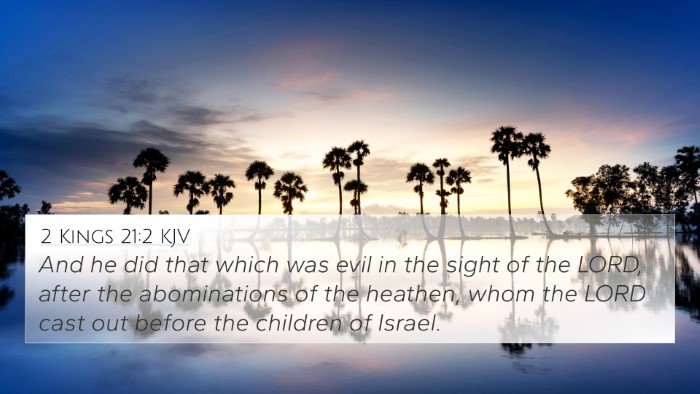Understanding 2 Kings 23:32
2 Kings 23:32 reads: "And he did that which was evil in the sight of the LORD, according to all that his fathers had done." This verse highlights the spiritual decline in Judah and serves as a critical point in the narrative concerning the kings of Israel and Judah.
Summary of Key Themes
This verse encapsulates several themes essential for understanding the context of Israel's monarchy and God's covenantal relationship with His people. It emphasizes the consistent pattern of disobedience among the kings and the consequences of turning away from God.
Commentary Insights
Matthew Henry's Commentary
Matthew Henry notes that the phrase "did that which was evil" signifies a continued rebellion against God's laws. He underscores that the kings of Judah often repeated the sins of their predecessors, leading the nation further into idolatry and moral decay. Henry elucidates that this verse serves as a reminder of the gravity of leadership in a theocratic society and how rulers influence the spiritual state of their people.
Albert Barnes' Commentary
Albert Barnes focuses on the implications of the king's actions, highlighting that the unfaithfulness exhibited not only affected the nation politically but also spiritually. He contextualizes this verse within the larger narrative of Judah's history, illustrating how such turning away from God sets the stage for future tragedies, including exile and destruction. Barnes emphasizes the importance of faithfulness in leadership and how divine judgment follows rebellion.
Adam Clarke's Commentary
Adam Clarke provides a detailed analysis of the kings mentioned, drawing connections with their predecessors’ actions. He points out that this verse serves to remind readers of the cyclical nature of sin within generational lines. Clarke remarks that the evil deeds of past kings had established a foundation of ungodliness that this king perpetuated. This cyclical downfall highlights the dire need for righteous leaders who uphold God’s statutes.
Thematic Connections
The verse evokes several thematic connections across the Bible that deepen our understanding of its message. Here are some related themes explored through cross-referencing:
- Judgment and Consequences: Deuteronomy 28:15-68 - The list of curses for disobedience emphasizes God's warnings regarding turning away from Him.
- Idolatry: 1 Kings 16:30-33 - Highlights Ahab's evil and idolatrous reign as a precursor to the decline noted in 2 Kings 23:32.
- Leadership and Influence: Jeremiah 7:15 - Addresses the consequences of leaders leading their people astray.
- Covenant and Faithfulness: 2 Chronicles 36:14 - Discusses how the unfaithfulness of the priests and rulers led to God's anger.
- Spiritual Heritage: Exodus 20:5 - The principle of visiting the iniquity of the fathers upon the children illustrates recurring patterns in familial sin.
- Rebellion against God: Romans 1:21 - This New Testament insight reflects the consequences of rejecting God's truth, paralleling the actions described in 2 Kings.
- The Role of Prophets: Isaiah 1:4 - Echoes the moral failure of the people and their leaders, similar to Judah's situation in 2 Kings 23:32.
Tools for Deepening Understanding
To further investigate the implications of this verse, the following tools can enhance your Bible study:
- Bible concordance – Essential for finding keywords related to specific themes.
- Bible cross-reference guide – Useful for identifying verses that connect with each other.
- Cross-reference Bible study methods – Integrate different passages for a better understanding of biblical themes.
- Bible chain references – Tools that link verses together to showcase thematic similarities.
- Comprehensive Bible cross-reference materials – Resources that provide a wide range of connections across scripture.
Conclusion
2 Kings 23:32 serves not only as a historical account but also as a stark reminder of the dangers of spiritual complacency. Through the lenses of Matthew Henry, Albert Barnes, and Adam Clarke, this verse can be appreciated in its complexity as it speaks to the nature of sin, leadership, and the dire need for faithfulness to God. Through the use of cross-references, one can gain a fuller understanding of how this verse relates to broader biblical narratives.




